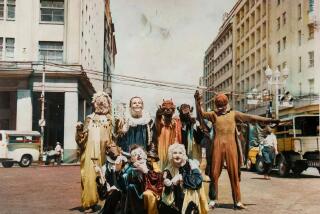DOS SANTOS RETROSPECTIVE BEGINS
- Share via
Nelson Pereira dos Santos, the father of Brazil’s Cinema Novo, will be honored with a retrospective of his work starting Friday at the Fox International, culminating a week later with the first run of his latest film, “Memories of Prison,” which was one of the finest offerings at the last Filmex.
Launching the series is “How Tasty Was My Little Frenchman” (1971), an outrageous dark comedy. When some nasty Portuguese sailors dump a Frenchman (Arduino Colasanti) overboard, he winds up on a tiny island off Brazil inhabited by cannibals. While Dos Santos keeps us wondering whether Colasanti is going to end up as a meal, he creates a convincing Garden of Eden, yet distances us from it in such a way as to remind us how hypocritical the plundering Europeans were in regard to the South American natives.
Every time the film verges on the idyllic, we’re brought up short by displays of the Frenchman’s basic venality, yet Dos Santos is too sophisticated, too ironic to extol the nobility of the savages even if he’s on their side. For program information: (213) 396-4215.
“Hollywood Freaks: The Horror and Romance of James Whale and Tod Browning” continues Thursday at 8 p.m. at UCLA Melnitz with Whale’s “The Old Dark House” (1932) and Browning’s “Freaks” (1932). The inspiration for countless gothics (and, finally, “The Rocky Horror Picture Show”), “Old Dark House” now elicits more laughs than chills.
A truly horrendous storm drives a group of young people (Raymond Massey, Gloria Stuart, Melvyn Douglas, followed later by Charles Laughton and Lillian Bond) to seek shelter in a gloomy house in the Welsh countryside. They’re greeted by none other than Boris Karloff, playing a mute, terribly scarred butler in the service of the strange Femm family--the wistful, inexplicably fearful Horace (Ernest Thesiger) and the deaf, spiteful Rebecca (Eva Moore).
Banned for more than 30 years (but seen occasionally over the last 20), “Freaks” remains undiminished in power as it tells with simplicity the story of a mercenary trapeze artist (Olga Baclanova) who marries a midget (Harry Earle) for his money, and her subsequent terrible fate.
By the end of the film, Browning has demonstrated that it’s society rather than nature that creates monsters. For show times and series information: (213) 825-2345.
“The Crucified Lovers” (1954), screening with Ozu’s sublime “Tokyo Story” as the first offering in a Wednesday-evenings Ozu/Mizoguchi series at the Nuart, is classic Mizoguchi, profound in its impact, flawless in its acting and told with the utmost economy.
Based on a 17th-Century Kabuki drama by the great Chikamatsu Monzaemon, it is an exquisite love story taking place in a society so rigid, so hierarchical, so totally concerned with appearances that an individual’s slightest misstep spelled disaster. It concerns an attempt by the beautiful young wife (Kyoko Kagawa) of the richest--but stingiest--old merchant in Kyoto to get some money for her profligate brother so her family’s name won’t be disgraced. Her action causes not only her life but those of her hateful husband (Eitaro Shindo) and a devoted servant (Kazuo Hasegawa) to collapse like a house of cards. For further information: (213) 478-6379 or 479-5269.
More to Read
Only good movies
Get the Indie Focus newsletter, Mark Olsen's weekly guide to the world of cinema.
You may occasionally receive promotional content from the Los Angeles Times.






